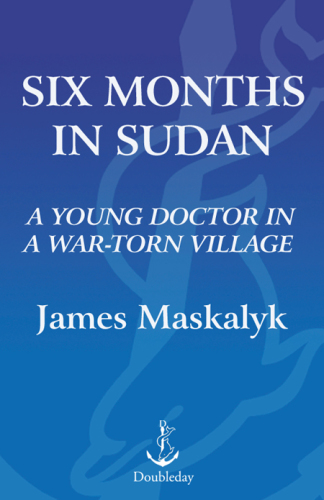
Six Months in Sudan
A Young Doctor in a War-Torn Village
یک دکتر جوان در روستای جنگ - تورن
کتاب های مرتبط
- اطلاعات
- نقد و بررسی
- دیدگاه کاربران
نقد و بررسی

April 20, 2009
When he signed up to do a stint with Médecins Sans Frontières in 2006, Maskalyk, currently assistant professor of emergency medicine at the University of Toronto, volunteered to go anywhere the organization wanted to send him, writing, “No wife, no kids, no house, no debt, no one waiting for me to get back.” He was posted in Abyei, an oil-rich region set squarely on the demarcation between north and south Sudan, where one of the bloodiest civil wars in Africa had recently ended. In a makeshift hospital, he saw dozens of sick people, most suffering—even dying—from treatable illnesses. In his six months of service, Maskalyk oversaw a measles outbreak and treated tuberculosis patients, mothers fatally injured during childbirth and countless malnourished children. Even if Maskalyk frustrates in his apolitical stance, refusing to ask why so many are suffering and merely lamenting the fact, he provides a raw and deeply felt account of his time in Sudan.

April 1, 2009
A doctor's memoir expands on his blogs, written while he worked at a Doctors Without Borders hospital in Sudan.
In 2007, Maskalyk (Emergency Medicine/Univ. of Toronto)—young, single and willing to go to an isolated, dangerous place—arrived in Abyei, a small village where conflict between militias of North and South Sudan compounded the stresses of extreme poverty. Here, the author avoids the political story, concentrating instead on the human one. Just getting from Canada to Sudan was a test of patience and endurance, valuable traits for anyone charged with providing medical care under the conditions in Abyei. The hospital's job was to treat acute illness, but it was besieged with emergency cases as well—victims of gunshot wounds and car accidents, women in protracted labor, children with rabies. A measles epidemic began shortly after Maskalyk's arrival, adding to the usual cases of tuberculosis, pneumonia, infections and fevers. Not everyone could be treated—those with chronic or minor problems had to be turned away, and hunger and death were common. The author's own trials included brutal heat, sleeplessness and a pervading feeling of helplessness. Maskalyk alternates entries from his blog with more reflective chapters written after he returned to Canada. The blogs have been slightly edited but retain the syntax and general format of the original, which slows reading but lends his work a you-are-there immediacy. A few photographs bear out his descriptions of the conditions. More about the culture of the Dinka, the tribe that made up most of his patients, would have enhanced Maskalyk's account, but he could not speak their language—a translator accompanied him in the hospital—and he spent most of his nonworking hours inside the compound that he shared with his co-workers.
A grim glimpse of stopgap measures in a world where humanity is desperately needed.
(COPYRIGHT (2009) KIRKUS REVIEWS/NIELSEN BUSINESS MEDIA, INC. ALL RIGHTS RESERVED.)

April 15, 2009
In 2007, physician and med school professor Maskalyk (emergency medicine, Univ. of Toronto) worked for Doctors Without Borders in the Sudanese village of Abyei. This memoir is an extension of the blogs he posted during that stint, with some of his original blog entries interspersed here. While Maskalyk's sacrifices and hard work in Sudan are surely admirable, his idiosyncratic and sometimes irritating stream-of-consciousness writing style detracts from what is otherwise an eye-opening and thought-provoking account of his challenging daily struggle to assist a Sudanese population afflicted by the dire ravages of poverty, malnutrition, war, and epidemics of contagious disease. Maskalyk's casual, impressionistic writing feels somewhat fragmented and disjointed, and the reader is left frustrated by the elusive, half-formed narrative of his immediate personal experiences before, during, and after his time in Africa. Readers seeking to better understand the causes of the Sudanese conflict might prefer Daoud Hari's "The Translator". An optional choice for general readers and also suitable for medical school or hospital libraries where there is interest in international public health or Doctors Without Borders.Ingrid Levin, Salve Regina Univ. Lib., Newport, RI
Copyright 2009 Library Journal, LLC Used with permission.

Starred review from May 15, 2009
Some people leave home to make good. Emergency medicine physician Maskalyk left home to do good or, rather, to just doto be in Sudan, to live, and to bring the rest of the world with him. It is why he maintained a blog while stationed as a M'decins sans Fronti'res (MSF) doctor in Ayei, a region on the border between north and south Sudan. It is why he wrote this absorbing book. He left his Toronto home with its creature comforts and moved to a place where he watched creatures dine on the grass roof of his hut, where he sifted other creatures out of the sugar, where it was so hot a thermometer sitting on a table had to cool down to take a patients temperature. Mostly, it is why he learned to endure the agony of helplessness, knowing that nothing could be done for some of the most severely sick except to watch them and chronicle the hour and causefeverof death. By alternating selections from his blog and post-tour recollections, Maskalyk limns a gut-wrenching picture of what MSF volunteers face in such poverty-ridden and dangerous circumstances and of how he learned to cope and how his experiences changed him.(Reprinted with permission of Booklist, copyright 2009, American Library Association.)

























دیدگاه کاربران